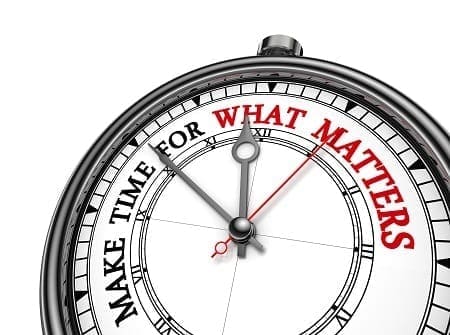Twenty-One Ways To Make Time For Measurement
by Stacey Barr |Measuring what matters is more important than most things we do. Here are 21 ways to become more conscious of what you can stop doing, to make time for performance measurement.

1. Stop reporting measures that no-one uses. Be daring – stop reporting what you know isn’t being used, and if anyone notices, use it as an opportunity to start a conversation about how to decide what is worth measuring and reporting.
2. Reduce your time in meetings. Meetings always take longer than they need to. The big time wasters are tangents, people arriving late and violent agreements that mistakenly sound like useful debates. Start on time, finish early and diplomatically manage the discussion.
3. Reduce the number of meetings you attend. Agree only to meetings that have a clear purpose that is aligned to your role and responsibilities. Don’t go to meetings out of obligation or interest alone.
4. Rank your priorities and drop the bottom 10%. List your tasks, both what you are doing and what you should be doing, and rank them in order of importance. Simply stop doing the bottom 10% – they are likely to have consequences far less than failing to measure what matters.
5. Design your weekly schedule to make time for measurement. Set a regular time in your diary that you block out for measurement related activities, then put the remainder of your tasks around that. Like Stephen Covey explains, put the big rocks (the important stuff) in first, and you’ll fit more of the smaller rocks in anyway.
6. Bring up measurement in corridor conversations and existing meetings. Don’t wait for measurement time. Use natural conversations that have even minor relevance to performance and results as an opportunity to talk about measures that matter.
7. Hold yourself accountable. Set yourself progress goals for choosing, creating and using measures, and reward yourself when you achieve them.
8. Get others to hold you accountable. Agree progress goals with your manager or colleagues or customers for choosing, creating and using measures. Set regular check-in time with them to pat yourselves on the back – or face the music.
9. Stop initiatives that are only treating symptoms. If you’re giving time to projects or initiatives that aren’t working, or aren’t fixing root causes of performance problems, stop the process and design a new one that incorporates measurement of root causes.
10. Save time by stopping when it’s good enough. Stop over-processing whatever you do, and get clear about the point at which you’ve done what will work, and don’t waste time gold-plating it.
11. Create a measurement mastermind group. Find like-minded people in your organisation and meet for lunch once a month to move through each other’s measurement challenges by sharing ideas and experiences.
12. Write yourself a compelling vision for measurement. Be clear about what you want to achieve with performance measurement by painting a picture of success, in sensory rich detail. Read this vision every day.
13. Outsource or delegate your low value tasks. Stop doing your own document formatting, internet research, meeting organisation and filing. If you can write a simple instruction for how to do it, then delegate it to graduate assistants, administrative assistants or even outsource to a virtual assistant.
14. Scale back your scope of what to measure. Just start by meaningfully measuring one area of performance, or one team’s goals. You don’t need to start with the utopian corporate measurement framework.
15. Motivate yourself and others with success stories. Research organisations that have done measurement well, and are successful on account of it. Try Harvard Business Review, or case studies on this blog.
16. Practice saying no. Take a chance and just try it. Say no to something you don’t believe is a good use of your time, or that is of lower importance than measurement of performance.
17. Avoid the office photocopier and coffee machine. Avoid getting caught up in office chit-chat by avoiding the locations where it happens, and by practicing escape strategies that release you quickly if you do get caught. There are better ways to build the relationships that matter.
18. Deter interruptions with crime scene tape. Physical markers are a fun way to let people know when you really want to focus on what you’re doing. Remember to turn off your phone and automatic email checking too.
19. Save time on existing tasks by using blocks. Group related tasks together – like writing, or making phone calls – and block out chunks of time in your diary to get through them. It’s faster and easier to stay focused.
20. Negotiate with your manager on the relative priority of measurement. Make it clear with your manager how important measurement is relative to your other tasks, and remind and help them to actively support this decision.
21. Share these tips with others you want to involve in measurement. Just send them a copy or share them in conversation, so they too can find more time for the important performance measurement activities.
BONUS TIP: Learn how to do measurement right, the first time. Don’t waste more time by doing measurement in the old ways of brainstorming and making do with traditional measures and existing data. Create and follow a performance measurement process that works.
TAKING ACTION:
What if you choose 5 things you can do now to stop doing what is less important than measuring performance? How would things change for the better, with even just one powerful performance measure about a result that really matters?
Connect with Stacey
Haven’t found what you’re looking for? Want more information? Fill out the form below and I’ll get in touch with you as soon as possible.
167 Eagle Street,
Brisbane Qld 4000,
Australia
ACN: 129953635
Director: Stacey Barr




